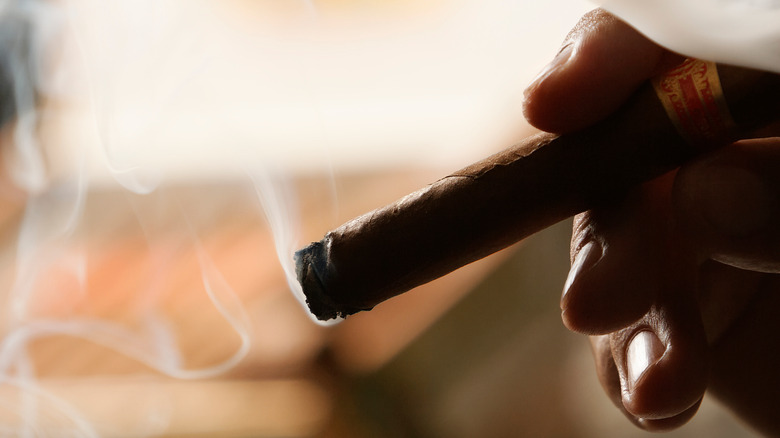Where The Phrase 'Close, But No Cigar' Comes From
If there was a time you were almost successful — but not quite — you may have heard the expression "close, but no cigar." It's entered the pantheon of phrases that are so common they're uttered without much consideration as to their meaning (is a cigar a standard of perfection you didn't meet? Was someone giving out a cigar as a reward?). In fact, the phrase is around a hundred years old at this point, according to Reader's Digest, dating back to a time when fairs and carnivals were mainly targeted at adults.
Nowadays, if you win a ring toss or shooting game, you might get a cheap branded stuffed animal or a slap bracelet. Back then, you might get a cigar. Though the prizes were a little more mature, the games were just as difficult to win, prompting plenty of carnival workers to say, "close, but no cigar." But how did the expression leave the carnival sphere and assume a broader meaning?
'You don't get the cigar'
In the late 19th and early 20th centuries, it was commonplace for fairs to give out cigars as prizes. It's referenced in the 1902 book "The Night Side of London" by Robert Machray, who also writes that it was unlikely people for people to actually win that cigar (via Reader's Digest): "Should you score twenty you will win a cigar. But you do no more than score nine. Undiscouraged, or perhaps encouraged by this fact, you spend another penny, and another, and another — but you don't get the cigar, and it is well for you that you don't! For there are cigars and cigars."
In 1929, a Long Island newspaper was perhaps inspired by nearby Coney Island when it wrote that a man who failed to win a community association presidency came close, but didn't get the cigar. According to Reader's Digest, this is the first known appearance of the phrase in print that's unconnected to a carnival. In the 1930s, the phrase grew increasingly popular, particularly in sports journalism, like one account of a 1935 trade by the Phillies, as Historically Speaking notes. Later, the phrase was used broadly in the banter of Hollywood movies, such as 1935's "Annie Oakley," in which the titular character jests, "Close, Colonel, but no cigar!"

